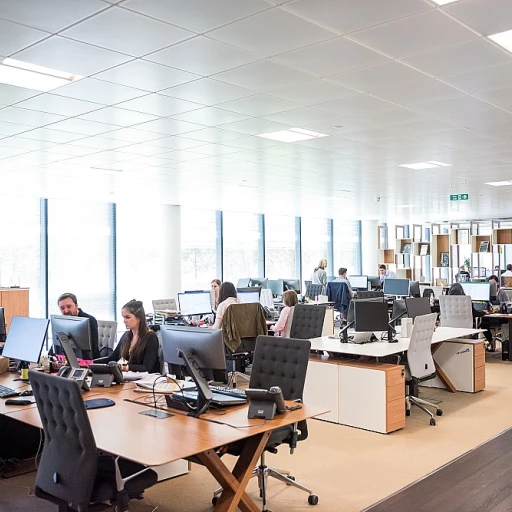
Understanding Desk Sharing in the UK Workplace
Exploring the Concept of Desk Sharing in Modern UK Workplaces
In the evolving landscape of the UK workplace, desk sharing has emerged as a pivotal strategy for optimizing office space and resources. As companies navigate the shift towards hybrid work models, understanding the nuances of desk sharing becomes crucial. This approach, often referred to as hot desking or desk hoteling, involves multiple employees using a single desk at different times, thereby maximizing the use of available office space.
Desk sharing is not just about saving space; it's about creating a dynamic work environment that caters to the needs of modern employees. With the rise of flexible work arrangements, many companies are adopting shared desk policies to accommodate hybrid work schedules. This flexibility allows team members to book desks as needed, fostering a more adaptable and efficient work environment.
Implementing desk sharing requires careful consideration of several factors, including the sharing ratio and the management of shared spaces. Companies must ensure that their workplace management strategies align with the needs of their employees, promoting both productivity and satisfaction. For more insights on how to enhance efficiency in such dynamic settings, consider exploring digitally managed solutions that streamline desk booking and space management.
As we delve deeper into this topic, we'll explore the benefits and challenges of desk sharing, the role of technology in facilitating these arrangements, and how employees can adapt to and thrive in shared work environments.
Benefits of Desk Sharing for UK Companies
Enhancing Company Efficiency and Employee Satisfaction
In the dynamic landscape of UK workplaces, companies are increasingly turning to desk sharing arrangements to foster productivity and satisfaction among team members. This approach allows for flexible and hybrid work models, which are becoming essential in today's work environment. By implementing a thoughtful sharing policy, organizations can achieve greater space utilization and cost-effectiveness. Desk sharing offers multiple advantages for both employers and employees. For employers, it allows optimal desk usage, minimizing unused office space and reducing the need for expensive real estate. An effective sharing ratio ensures that desks are available for those in the office, while maintaining the hybrid work model that many businesses have adopted. From an employee perspective, shared desk arrangements can enhance the work experience by promoting interaction and collaboration between diverse teams. This encourages a more dynamic workplace culture, fostering innovation and cross-team relationships. Furthermore, tools like hot desking and desk booking systems simplify the process of finding and securing a workspace, creating a seamless transition between remote and office work. Moreover, flexible work setups can lead to higher job satisfaction among employees, as they are granted more autonomy over their working conditions. By integrating desk hoteling and other advanced workspace management strategies, companies can create an agile and adaptable office setting that meets the needs of modern workforces. For organizations exploring desk sharing, understanding the nuances involved is essential. Implementing hot desking can bring about challenges, but with effective management and communication, these can be navigated successfully. To learn more about the implementation process, you may want to explore various strategies for optimizing desk utilization in a hybrid office.For additional insights on enhancing operational efficiency, consider reviewing this comprehensive guide on optimising retail procurement operations in the UK.
Challenges and Considerations in Implementing Desk Sharing
Overcoming Adoption Barriers
Transitioning to a desk sharing environment involves several hurdles, which companies must strategize to mitigate. One of the major concerns is the resistance from employees who may find comfort in having their dedicated workspaces. Unfamiliarity with shared desks can create unease concerning personal space and hygiene considerations. Recognizing these issues and addressing them upfront is crucial to successful implementation.
Establishing a Thoughtful Sharing Policy
A clear and thoughtful sharing policy is the backbone of a successful desk sharing system. This should delineate the sharing ratio, aligning with the company’s hybrid work model. Effective workplace management includes crafting flexible, yet firm guidelines that balance office space utilization with employee needs. A well-structured policy also reassures team members that the desk booking system will be managed fairly and consistently.
Handling Logistical Challenges
Implementing a desk sharing strategy is not devoid of logistical hurdles. Companies must invest in the necessary infrastructure to support hot desking and desk hoteling. This might involve rearranging the office layout to accommodate shared spaces efficiently. Employers should also explore solutions that simplify desk booking processes, thereby reducing complexities experienced by employees in hybrid office setups.
Maintaining Optimal Work Environments
To foster an optimal desk sharing environment, businesses need to provide easily accessible resources such as sanitizing stations, secure storage for personal items, and reliable tech support. Encouraging employee feedback regarding shared desk arrangements can offer insights into improving the work environment. Furthermore, incorporating these insights in refining the process can enhance overall employee satisfaction and productivity.
Technology's Role in Facilitating Desk Sharing
Leveraging Technology for Seamless Desk Sharing
In a landscape that sees more UK organisations embracing office flexibility, integrating technology has become pivotal for effective desk sharing management and nurturing an optimal work environment. The implementation of desk booking systems isn't a mere trend. Such technology allows employees to book desks ahead of time, ensuring they have a dedicated office space when necessary while supporting the hybrid work model. This approach allows for a balanced sharing ratio, accommodating both in-office and remote team members. Hot desking and desk hoteling software have gained traction, providing crucial support for shared desk arrangements. These systems help management oversee space allocation, thus preventing situations where employees are left without a working area or feel excluded from the shared environment. Moreover, these tools often come equipped with analytics capabilities, enabling workplace management teams to assess usage patterns and make informed decisions about reallocating or redesigning spaces. Furthermore, integrating technology facilitates enhanced communication and collaboration among employees, even when physically dispersed. Shared online platforms and collaborative tools foster a team-oriented culture, keeping team members connected and productive despite varying work schedules. By adopting these technological solutions, companies can ensure that flexible desk arrangements lead to increased employee satisfaction, improved space utilization, and sustained operational efficiency. This careful implementation of desk sharing policies is instrumental in overcoming potential friction in adopting new working practices.Employee Adaptation and Satisfaction
Employee Adjustment and Contentment in a Flexible Work Setting
As workplaces in the UK continue to adapt with flexible desk arrangements, the focus on employee adaptation and satisfaction is more crucial than ever. In a dynamic work environment, where desk sharing and hot desking are prevalent, understanding how employees adjust is key to ensuring a harmonious office atmosphere. Firstly, effective communication about the shared desk policy is fundamental. Employees need to be informed of the expectations and the benefits of a hybrid work setup. This helps to align the team's mentality towards a collective goal, boosting morale and productivity. Secondly, giving team members the autonomy to book desks allows for a sense of control over their work environment. Desk booking systems empower employees by enabling them to choose their preferred desks, thereby fostering satisfaction. A well-organized booking system assists in preventing misunderstandings and maintaining desks' optimal usage. In addition, management plays a pivotal role in promoting a healthy work culture. Regular feedback and open lines of communication can address any concerns employees may have regarding shared spaces. It's essential for workplace management to actively engage with employees and adjust the sharing policy as needed to maintain a positive working environment. Moreover, successful desk sharing relies heavily on promoting a team-centric approach where each employee feels valued. Encouraging collaboration and shared goals among team members can help mitigate any apprehension about the new office space arrangements. Overall, the thoughtful implementation of desk sharing can improve employee satisfaction by creating a more flexible and team-oriented work environment. By actively involving employees in the transition and encouraging feedback, UK companies can navigate the complexities of hybrid work arrangements effectively.Case Studies of Successful Desk Sharing in the UK
Examples from the British Workforce
In the dynamic landscape of modern UK workplaces, several organisations have successfully implemented desk sharing solutions, setting real-world examples for others to follow. These cases highlight practical insights and maximise efficiency through shared desk arrangements.
One standout example comes from a vibrant technology company which embraced the hybrid work model, leading to enhanced space utilisation. By implementing a desk booking system, they achieved a well-balanced sharing ratio that accommodated both in-office and remote employees. The incorporation of flexible work policies effectively optimised the office space, allowing team members to enjoy a comfortable and dynamic work environment.
Another exemplary case involves a medium-sized UK consultancy firm that embraced hot desking. They allowed flexibility by offering a range of hot desking spaces to their workforce. Prior to this, they faced challenges with underutilised office capacity during peak hybrid periods. The solution encouraged employees to view their desk as shared resources, promoting an atmosphere of teamwork and collaboration within the workplace.
Furthermore, a leading financial institution adopted an integrated workplace management system to facilitate smooth desk hoteling. This initiative demonstrated the effectiveness of using technology to seamlessly manage shared desks and book desks. The outcome was a notable improvement in employee productivity and satisfaction, showcasing that thoughtful strategies coupled with technology can enhance workplace management.
These case studies exemplify the potential of strategic implementing desk sharing policies. They not only improve utilisation but also enrich the overall work environment for employees. Through these examples, companies can learn and draw inspiration to tailor their own hybrid office solutions effectively.













